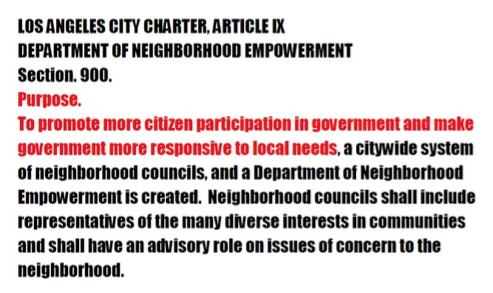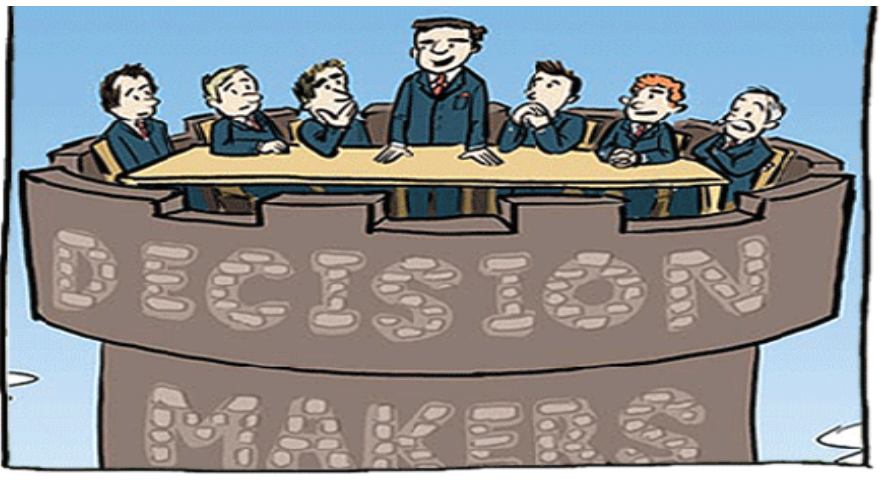CommentsVOICES-The Neighborhood Council system was created to give the public a voice. The Los Angeles City Charter states that their purpose is, "To promote more citizen participation in government."
It's the duty of NC board members to reach out to the community, to engage them, and to make sure they have a say in decisions that affect them.
Unfortunately, it doesn't always work that way.
Take the recent special meeting held on Wednesday, February 13, 2019 by the East Hollywood Neighborhood Council (EHNC). If an NC decides that a special meeting is necessary, it should have a pretty good reason. It also needs to make a special effort to get the word out, not just to board members but to stakeholders as well. And it needs to make sure that stakeholders are aware of the action items on the agenda so that they can weigh in on matters they're concerned about.
 That wasn't the case with the EHNC's special meeting. According to the NC's web site, the next regularly scheduled meeting was supposed to take place on February 25, but this meeting happened 12 days before that date, and it seems that stakeholders had no idea a special meeting had been called. Apparently, the board members were told that a special meeting was necessary to make decisions on items related to upcoming NC elections. While a look at the lengthy agenda shows three items having to do with the elections, there are over a dozen other items having to do with everything from community relays and hygiene kit drives to affordable housing and the NC's Planning and Land Use Management (PLUM) Committee. This last item is crucial, because at the meeting a majority of board members approved sweeping changes to the structure, membership and meeting dates of the Committee.
That wasn't the case with the EHNC's special meeting. According to the NC's web site, the next regularly scheduled meeting was supposed to take place on February 25, but this meeting happened 12 days before that date, and it seems that stakeholders had no idea a special meeting had been called. Apparently, the board members were told that a special meeting was necessary to make decisions on items related to upcoming NC elections. While a look at the lengthy agenda shows three items having to do with the elections, there are over a dozen other items having to do with everything from community relays and hygiene kit drives to affordable housing and the NC's Planning and Land Use Management (PLUM) Committee. This last item is crucial, because at the meeting a majority of board members approved sweeping changes to the structure, membership and meeting dates of the Committee.
How was the meeting publicized? A hard copy of the agenda was posted in a single location, inside the Hollywood Hotel. While hotel guests might have spotted it on the way to their room, members of the general public would have had to enter the building to view it. The agenda was posted on the EHNC web site, but since the regular meeting wasn't scheduled until the end of the month, members of the public would have to have some way of knowing it had been posted. Notice was posted on Facebook on Monday night after 11 p.m., less than 48 hours before the meeting, but there was no link to the agenda. Stakeholders who weren't on Facebook or who missed the item on their feed would have no way of knowing a meeting had been called. While board members were notified, it doesn't seem that an e-mail was sent, and at least one board member says she just got a phone call. Some board members didn't see an agenda until they arrived, and even then, there weren't enough to go around.
None of the EHNC stakeholders I've communicated with had any idea that a meeting had been called until after it was over. Which means they had no idea that the EHNC board was voting on a number of action items that night, many of them having nothing to do with NC elections. The turnout for the meeting shows that there was a failure in communication. While enough board members were there to achieve quorum, only three members of the public attended, and two of them were developers presenting a project.
I sent emails to three of the EHNC's officers to ask them about the special meeting. Only Treasurer Jeff Zarrinnam got back to me. In answer to my questions about the reason for the special meeting, he responded, "Normal practice per bylaws is that All meetings and agendas are called and made by the chair of the board/president and if committees by the chair of the committee." Assuming this is accurate, it seems that the President decided to call the meeting and prepared the agenda, including the items related to the PLUM Committee. In answer to a query about notifications, he said, "Normal practice is that meeting agendas are posted on the website, Facebook, Instagram and a paper agenda posting at the designated posting place which the the [sic] community bulletin board at the Hollywood Hotel. All board members are also emailed as well as anyone who subscribed to the email newsletter."
Apparently, in this case not all board members got an email. Tracy Walker serves on the EHNC board. She told me she did not receive an email, and instead was informed of the meeting by a phone call from the President. Apparently, there was no email sent to a standard distribution list. And the part about notifying subscribers to the newsletter is kind of weird. There should be a distribution list that includes all stakeholders with email addresses. This should be completely separate from any newsletter list. I looked at the EHNC Bylaws, and it says notifications will be "emailed out to Stakeholders if the EHNC maintains such a database." What? "IF" the EHNC maintains such a database? This makes it sound like there may not even be an email distribution list for stakeholders, which is really bizarre. Why wouldn't they have such a list?
Walker was not surprised that she didn't receive an email about the special meeting. She says she rarely receives emails informing her of board meetings and other activities. And she was bothered by the fact that the board took action on a wide variety of items when she'd been told that the meeting was called to deal with business related to upcoming NC elections. After the meeting, Walker wrote to the board asking that all votes be rescinded.
Unfortunately, there are factors that suggest the leadership's lapses in calling the special meeting may have been intentional. Of the 15 things listed under "Action Items" on the agenda, six of them have to do with making changes to the membership, structure, and meeting dates for the NC's PLUM Committee. All six were approved. Strangely, three longtime members of the PLUM Committee, including the Co-Chair, did not receive any notice of the special meeting. These include former EHNC board member Doug Haines, a longtime Hollywood resident and activist; Ed Hunt, a retired architect and landscape architect; and Charles Fisher, a historian and preservationist with years of experience in the Hollywood area. These three longtime EHNC stakeholders have been members of the PLUM Committee for years, lending their expertise to the decision-making process. The fact that none of them received written or verbal notification of the meeting seems like more than a lapse in communication.
Haines and Hunt also believe the votes should be rescinded. While Zarrinnam simply says that the President created the agenda, Haines and Hunt say that the items dealing with the PLUM Committee were placed on the agenda at Zarrinnam's request. Haines and Zarrinnam have been serving as Co-Chairs of the PLUM Committee, but the new rules would remove Haines as Co-Chair. The new rules would also make him ineligible for the newly created position of Vice-Chair, since he doesn't currently serve on the board. Just the creation of the Vice-Chair position is questionable, since it's not provided for in the EHNC's Bylaws, and there's nothing on the agenda to indicate that a revision of the Bylaws was being proposed.
Haines believes the new rules were created to remove him as Co-Chair and put Zarrinnam in control, and he sees a conflict of interest. Zarrinnam is President and CEO of Zarco Hotels, which owns the Hollywood Hotel. (The Hollywood Hotel is the location where EHNC meetings are held and the place where a hard copy of the special meeting agenda was posted.) Zarrinnam is Chair of three Hollywood-area Business Improvement Districts, and also served as the 2017-2018 Chair of the Board of the Hollywood Chamber of Commerce. Since the rules approved at the special meeting make Zarrinnam de facto Chair of the PLUM Committee, he would exercise considerable influence over the board's decisions related to planning. While business interests certainly should have a voice in planning decisions, Haines fears that other stakeholders will have less of a voice with Zarrinnam in charge.
Hunt filed a formal complaint with the EHNC, on the grounds that: 1) not all board members received a copy of the agenda in advance, and not enough copies were printed for the meeting; 2) the changes to the PLUM Committee rules violate the EHNC's bylaws; 3) the change of PLUM meetings dates makes it difficult for current committee members to attend; and 4) action was taken on several agenda items that had not been reviewed by the PLUM committee or the public for comment.
The Neighborhood Council system was created to make sure the public's voice is heard. That didn't happen here. The community wasn't able to participate because the community wasn't told what was going on. Because of the numerous irregularities in calling the special meeting, Haines believes the Department of Neighborhood Empowerment (DONE) must intervene and call on the EHNC to rescind all actions that were approved. But apparently the Department has no interest in taking action, or even investigating. Repeated attempts to contact DONE by Haines, Hunt and Walker have been met with silence.
Haines is frustrated, not just by the problems surrounding the EHNC's special meeting, but by the leadership's ongoing failure to inform the community about issues that affect them. The EHNC leadership seems to have trouble just doing the basics. Why isn't there a standard e-mail distribution list that includes all board members and all stakeholders? Why aren't all meeting notices automatically sent to that list, along with an agenda? Why doesn't the EHNC even post all meeting minutes on their web site? There are only five sets of minutes posted for 2018, for the months of March, April, May, June, and August. Only one set of minutes is posted for the entire year of 2017. And none are posted for 2016. This isn't brain surgery. Most NCs manage to do all these things.
Let me say it again: The purpose of the NC system, as stated in the City Charter, is "To promote more citizen participation in government." ALL stakeholders should receive notice of every meeting. ALL stakeholders have a right to be informed about business before the board. ALL stakeholders need to have a voice in the decision-making process to make sure that decisions are made through an open, objective process that isn't unduly influenced by special interests.
NCs were created because citizens felt they were being shut out of the decision-making process by City Hall. If NCs are going to start shutting stakeholders out, then we're in serious trouble.
(Casey Maddren is President of United Neighborhoods for Los Angeles (UN4LA), a community group advocating for better planning, and a CityWatch contributor.) Prepped for CityWatch by Linda Abrams.

















